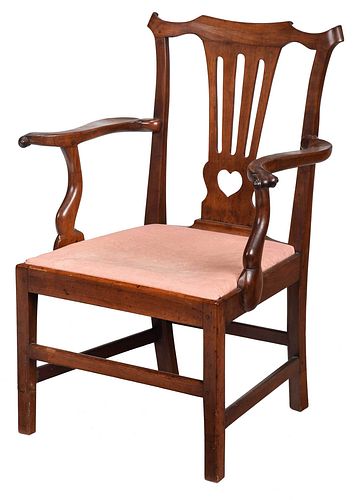Rare Virginia Chippendale Walnut Armchair, Lord Fairfax
Bid Increments
| Price | Bid Increment |
|---|---|
| $0 | $25 |
| $100 | $50 |
| $1,000 | $100 |
| $2,000 | $200 |
| $3,000 | $250 |
| $5,000 | $500 |
| $10,000 | $1,000 |
| $20,000 | $2,000 |
| $50,000 | $5,000 |
| $100,000 | $10,000 |
attributed to William Walker Jr., Strafford County, Virginia, circa 1771-1772, serpentine crest over heart pierced splat, scrolled arms, square legs with stretchers, 39 x 28-1/2 x 22 in.
Note:This rare Virginia set of chairs is discussed in Robert Leath, "Robert and William Walker and the Ne Plus Ultra: Scottish Design and Colonial Virginia Furniture 1730-1775", Chipstone American Furniture Journal, 2006
Leath indicates that "The best indication of Robert Walker's influence comes from recent discoveries related to his nephew, William. By 1763, William Walker Jr. had established his own cabinetmaking business in the Falmouth area and opened an account with Scottish merchant William Allison under the heading "Mr. William Walker, Joiner and Cabinet maker." In 1770 and 1771, Walker received commissions for two sets of walnut chairs from Thomas (1693-1781), Lord Fairfax, of Greenway Court in nearby Frederick County. Each set included an armchair priced at 30 shillings and six side chairs priced at 20 shillings. In 1928, Samuel T. Freeman and Co. of Philadelphia sold a set of chairs - one arm, four matching sides - that reputedly belonged to Fairfax. Although the location of these chairs is unknown, an armchair identical to the pictured example (George Washington's Fredericksburg Foundation) serves as a benchmark for separating Robert Walker's work from that attributed to his nephew." The chair offered here appears to be identical to these chairs, and is likely from the Fairfax set.
Provenance: Rago 2012; Private Collection, Charlotte, North Carolina
Condition
legs ended out approximately 4-1/2 inches, with cracks, distress, and glue residue at attachment points, top of one arm support ended out, shrinkage crack at crest rail, slip seat replaced
Available payment options
Purchased items will be available for pick up or shipping from our Asheville, North Carolina auction facility within ten business days of the auction will be assessed a storage fee of $5.00 per day, per item. Purchaser agrees that packing and shipping is done at the purchaser's risk and that the purchaser will pay in advance all packing expenses, materials, carrier fees and insurance charges. At our discretion, items will either be packed by an agent such as a packaging store or Brunk Auctions. Please allow two weeks for shipping after payment is received. Shipment of large items is the responsibility of the purchaser. We are happy to provide names of carriers and shippers if a purchaser so requests. Brunk Auctions will have no liability for any loss or damage to shipped items.

















